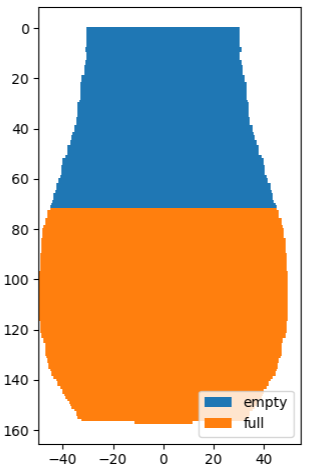I’d weigh the jug as-is, then weigh it full, and then weigh it empty; the proceeding trivial calculation of the original filled volume would be arguably more accurate.
The engineering way to do it. Why go through the trouble of perfectly modeling it if you can just test a few times. Either that or consider the jug a cylinder and add a safety factor of 2.
It also gives you a way to validate your calculations when you inevitably do model it.
the safety factor got me
Behold, the pragmatist.
You can’t weigh the jug, because it’s in an image.
Anyone with a couple brain cells to rub together can figure out how full a physical jug of water is in a number of ways. The joke is that only an autistic person would try to produce an exact measurement based off an image.
Why do High Functioning / Savants get to represent all autistic people all the time ?
EDIT : 60.69% of the time.
Anyone else bothered by the inconsistent conjugation here? Should be “optimism” and “pessimism” to go with “autism”.
Yes. Or change “autism” to “autist”.
Yeah you definitely could. Personally I wouldn’t be bothered by it in a humorous context like this. But I know that’s a term that does sometimes cause offence, so I chose the alternative.
Hey we need people like that, remember when an autistic person discovered few hundred millisecond delay in ssh which uncovered Jia Tan backdoor.
Is there an article about that, I would like to read some more about this topic😊
This is the original email by the person who discovered this backdoor. But if you want you can search for xz backdoor and you’ll find a lot more articles which explain timelines and other things. https://www.openwall.com/lists/oss-security/2024/03/29/4
== Observing Impact on openssh server == With the backdoored liblzma installed, logins via ssh become a lot slower. time ssh nonexistant@...alhost before: nonexistant@...alhost: Permission denied (publickey). before: real 0m0.299s user 0m0.202s sys 0m0.006s after: nonexistant@...alhost: Permission denied (publickey). real 0m0.807s user 0m0.202s sys 0m0.006sThat’s a 500ms or 0.5s difference
Thanks 🙏👌✌️
hey where is the high res image? i need to check the math
A) The water isn’t pure there will be minerals dissolved in it
B) There is likely water vapor in the air occupying the jug
No. The fullness or emptiness depends on whether the last action was pouring water into or out of the jug.
Exactly - or the next action. The question “is the glass half full or empty” is a false dichotomy, the answer is: it is impossible to know without further info.
How exactly does it depend on next action? Is it half full by that logic if next action would be to fill it up further?
Yes. If the next action is to add it’s half full, if to remove it’s half empty. If nothing then it depends on the previous actions.
So the glass is in a quantum superposition until an entity decides to act on it
That’s funny. But the glass is not in a superposition, the answer to the question is. It’s a glass that contains water and is just sitting there observable by all probably sick of being subject to stupid questions that have no meaningful answer.
i’m not too fond of the autistic superintelligence meme. yes there are people like this, but personally i can’t math for shit.
i could probably go on about an interesting locomotive i found yesterday if you want a few hours wasted though…
I didn’t read super intelligence into it, I read overdoing and I found that it struck home. I don’t know math either, but if I did, I would have done the same calculation.
that’s fair.
The topology enthusiast says the jug is full of glass
Literalist: The glass contains about 50% water.
Nihilist: The glass doesn’t matter.
Anarchist: The glass is now full of piss.
Absurdist: the glass is now upside-down without spilling the water.
Me: I don’t know who’s glass this is so it’s going in the sink.
Dadaist: ce n’est pas un verre.
Pfff… Didn’t even calculate for the rate of evaporation of the water… Amateur…
This roughly checks out. I’m getting 66%, based on the methodology of cutting out the jug’s shape from the picture and numerically integrating the filled and empty volume (e.g. if a row is
dpixels wide, it contributesd^2to the volume, either filled or empty depending on whether it’s above or below the water level).
@lukewarm_ozone I hope you actually did that math.
The thing I said I did? Yes; here’s the processed image:

If you mean the math in the post, I can’t read it in this picture but it’s probably just some boring body-of-rotation-related integrals, so basically the same thing as I did but breaking apart the vase’s visible shape into analytically simple parts, whereas I got the shape from the image directly.
Engineers: the jug is twice as big as it needs to be
It has a safety factor of 2 dB.
What’s really gonna bake your noodle is that the jug will be less full of you tilt it to the right slightly.
Why?
Because the pouring spout is to the right. Tip it, you’ll see. It works better if you are staring closely at the spout from below when you do so.
Unless there’s air inside the water














